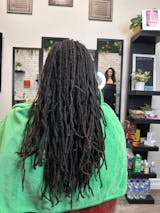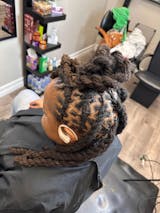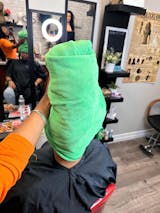Water and life on Earth
In order for us to understand what the big deal is with water, we need to go all the way back to the beginning of life on our planet. It's no coincidence that one of NASA's guiding policies in their search for alien life in other planets is to simply “follow the water.” The reason for this is that whether it was in hydrothermal ponds, ice sheets or deep down at the bottom of the ocean, scientists now know that the first living organisms on Earth would've needed H2O to be able to grow, divide and evolve.
Water is literally EVE👏🏽RY👏🏽WHERE👏🏽 from vast oceans to the invisible molecules that make up vapor in the air. While we can see the physical properties of water, it also has many chemical, electrical, and atomic-scale properties that affect all life and substances on Planet Earth. With its unusual structure it serves as a mediator of life's chemical reactions; one of water’s most impressive reactions that we can visually enjoy is the refraction of light (this creates rainbows!) Refraction put in simple terms is just water bending light. The light that comes from the Sun, known as white light, is composed of all different colors (red, orange, yellow, green, blue, indigo, violet). So when this colorful light passes through the water droplets present in the clouds the light bends inside of the droplets and all of the colors are scattered. The light keeps reflecting itself through the water thus creating a rainbow. So the next time you’re watching a rainbow in wonderment remember that without water this magical spectacle of natural beauty would not be possible.
Water and the human body
Now, we've all heard that the human body is 60% water. Well, this statement is not exactly right, since not all humans have the same percentages of their bodies made up of water. Tiny humans, a.k.a. babies and kids, have more water percentage than adults. Get this: A baby is about 78% water at birth!

But in adult women that percentage drops to about 55%. The reason for that is that fat tissue doesn't have as much water as lean tissue. Since women have breasts (and they are mostly composed of fat tissue) women's bodies have more fat tissue to make up their body than men. Therefore, in adult men the water percentage is about 60% of their entire body.
But the impact that this molecule has in our body is far greater. Often referred to by scientists as "the molecule of life,” water serves a multitude of essential functions that sustain our bodies every day. It's a vital nutrient in the life of every cell since it acts as a building material and it allows them to grow, multiply, and survive. Our brains need water in order for it to manufacture hormones and neurotransmitters. Water also acts as a shock absorber for the brain, spinal cord, and the fetus during gestation. Water helps deliver oxygen all through our bodies, helps mucosal membranes stay moist, and lubricates our joints.
But wait ... there's more! 👁👄👁
Water also helps our body in the process of digestion by converting the food we eat into the components needed for our survival. These components are essential nutrients such as vitamins and minerals that perform hundreds of roles in our body — like converting food into energy, healing wounds, and repairing cellular damage. Our saliva, which also aids in the digestion process, is formed by water, too. Water is also responsible for regulating the temperature of our bodies through perspiration and respiration and it flushes our organs of harmful toxins and waste mainly through urine.
So it's no surprise that water is the major component of most of our body parts. This molecule is in our blood, our brain, heart, lungs, kidneys, muscles, bones, and skin.
Water and skin health
Let's not forget that skin is the largest organ of the human body. So we should take the way our skin looks as a direct response to our bodies’ overall health. Experts, physicians, and scientists unanimously agree that drinking a generous amount of water on a daily basis is beneficial for skin cells. Water hydrates the skin and enhances our natural complexion; when the skin doesn't receive a sufficient amount of water the dehydration will cause it to look dull, flaky, and dry.
If our skin is dry it loses elasticity, has less resilience, and it is prone to wrinkling. Cold water can minimize skin's redness; it can tighten pores and prevent them from being clogged, which is one of the main causes for acne. Compresses of cold water underneath the eyes can prevent and help reduce puffiness in the area. Meanwhile warm water helps open the pores of the skin and helps to remove the dirt.
Water and hair health
Dehydration, or just not drinking enough water, also affects our hair. Water supplies the hair with strength in our roots so they can grow and it maintains the levels of keratin — which increases the hair volume and it darkens our hair color. When the body detects a shortage of water it will start to borrow water from different parts of the body. Unfortunately this leads to hair loss, breakage, and thinning of hair strands. Not only that, water keeps our hair clean while it reduces the dirt and oil build-up on the scalp, making our hair look shiny and feel strong.
As mentioned above, we highly recommend starting off your wash with warm water, as it opens up your hair cuticles and the pores in your scalp, which helps in the removal of sweat, dirt, and oil that can accumulate but also rinsing out your shampoo with warm water as well (make sure your hair is completely suds-free). Then a final rinse with cold water, this step is especially important since open cuticles absorb oil and moisture faster. Cold water helps with closing these cuticles and tightens your pores which protects your scalp from clogged pores (which can slow down hair growth). Additionally, closed cuticles make your hair feel and look smoother, this can make the hair look shiny and glossy all on its own without the need of extra products.
Summary
Water (“the molecule of life”) serves a multitude of essential functions that sustain our bodies every day. It's a vital nutrient in the life of every one of our cells since it acts as a building material and it allows them to grow, multiply, and survive. Water is the major component of most of our body parts: it’s in our blood, our brain, heart, lungs, kidneys, muscles, bones, and skin. Water hydrates the skin and enhances our natural complexion; when the skin doesn't receive a sufficient amount of water the dehydration will cause it to look dull, flaky, and dry.

Dehydration, or simply not drinking enough water, also affects our hair as water supplies the hair with strength in our roots so they can grow and it maintains the levels of keratin. This leads to hair loss, breakage, and thinning of hair strands. Not only that, water keeps our hair clean while it reduces the dirt build-up on the scalp, making our hair look shiny and feel strong. This is the reason why water is always an indispensable main ingredient in all our soap bars and aloe vera the principal ingredient in our hydrating hair mists (since aloe vera is 99% water). We should consider proper hydration a key to our overall good health, a well-hydrated body is able to carry out every day functions and provide you with healthy brain activity, so you can always give your best!
Tip: Ocean water, which is highly rich in nutrients, can cleanse, repair and detangle the hair strands because it contains sea lettuce and red algae particles. This cleanses the hair without excessive drying or stripping of its natural oils. Remember, ocean water should always be rinsed out with fresh water because the salt can dry out your scalp and hair over time. Also, people with dyed hair should be cautious because their hair is more prone to damage from ocean water. Avoid chlorinated water though; we always recommend the use of hair caps before fun in the pool.
Sources and more information:- Dunbar, B. (n.d.). Water: The Molecule of Life An Interview with Philip Ball. NASA. Retrieved from: https://www.nasa.gov/vision/universe/solarsystem/Water:_Molecule_of_Life.html.
- Jordan , S. (2020, November 14). Origins of life: new evidence first cells could have formed at the bottom of the ocean. The Conversation: academic rigor, journalistic flair. Retrieved from: https://theconversation.com/origins-of-life-new-evidence-first-cells-could-have-formed-at-the-bottom-of-the-ocean-126228
- Marshall, M. (2016, October 31). Earth - The secret of how life on Earth began. BBC. Retrieved from: http://www.bbc.com/earth/story/20161026-the-secret-of-how-life-on-earth-began.
- Marshall, M. (2020, December 9). How the first life on Earth survived its biggest threat - water. Nature News. Retrieved from: https://www.nature.com/articles/d41586-020-03461-4.
- Mitchell, H.H., Hamilton, T.S., Steggerda, F.R., & Bean, H.W. (1945). The chemical composition of the adult human body and its bearing on the biochemistry of growth. Journal of Biological Chemistry, 158, 625-637. Retrieved from: https://www.jbc.org/article/S0021-9258(19)51339-4/pdf
- Sargen, M. (2019, September 26). Biological Roles of Water: Why is water necessary for life? Science in the News. Retrieved from: https://sitn.hms.harvard.edu/uncategorized/2019/biological-roles-of-water-why-is-water-necessary-for-life/. USGS science for a changing world.
- Top 8 Benefits Of Water For Skin And Hair. The Berkey. (n.d.). Retrieved from: https://theberkey.com/blogs/water-filter/top-8-benefits-of-water-for-skin-and-hair.
- USGS| science for a changing world. (n.d.). The Water in You: Water and the Human Body. Retrieved from: https://www.usgs.gov/special-topic/water-science-school/science/water-you-water-and-human-body
- Water Science School. Water Basics | USGS.gov. (n.d.). Retrieved from: https://www.usgs.gov/special-topic/water-science-school/science/water-basics.
- Wells, S. (2016, October 19). The Science of Rainbows. Smithsonian Science Education Center. Retrieved from: https://ssec.si.edu/stemvisions-blog/science-rainbows.




